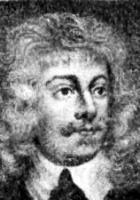Sir John Suckling
Sir John Suckling Poems
Dost see how unregarded now
That piece of beauty passes?
There was a time when I did vow
To that alone;
...
Out upon it, I have lov'd
Three whole days together;
And am like to love three more,
If it prove fair weather.
...
I will not love one minute more, I swear!
No, not a minute! Not a sigh or tear
Thou gett'st from me, or one kind look again,
Though thou shouldst court me to 't, and wouldst begin.
...
I prithee send me back my heart,
Since I cannot have thine;
For if from yours you will not part,
Why, then, shouldst thou have mine?
...
Why so pale and wan, fond lover?
Prithee, why so pale?--
Will, when looking well can't move her,
Looking ail prevail?
...
Why so pale and wan fond lover?
Prithee why so pale?
Will, when looking well can't move her,
Looking ill prevail?
...
Out upon it, I have lov'd
Three whole days together;
And am like to love three more,
If it prove fair weather.
...
When, dearest I but think of thee,
Methinks all things that lovely be
Are present, and my soul delighted:
For beauties that from worth arise
...
If you refuse me once, and think again,
I will complain.
You are deceiv'd, love is no work of art,
It must be got and born,
...
I prithee spare me gentle boy,
Press me no more for that slight toy,
That foolish trifle of an heart;
I swear it will not do its part,
...
One of her hands one of her cheeks lay under,
Cosening the pillow of a lawful kiss,
Which therefore swell'd, and seem'd to part asunder,
As angry to be robb'd of such a bliss!
...
O for some honest lover’s ghost,
Some kind unbodied post
Sent from the shades below!
I strangely long to know
...
Oh, for some honest lover's ghost,
Some kind unbodied post
Sent from the shades below!
I strangely long to know
...
Her feet beneath her petticoat
Like little mice, stole in and out,
As if they feared the light.
...
There never yet was honest man
That ever drove the trade of love;
It is impossible, nor can
Integrity our ends promove:
...
Sir John Suckling Biography
Born to an old and wealthy Norfolk family, Suckling was educated at Westminster School, Trinity College Cambridge and Grays Inn. He inherited the family wealth at 18 and pursued a military and ambassadorial career overseas which saw him knighted in 1830. He returned to the English court in 1632 where through his wealth and charm he was known as an elegant and popular gallant and gamester, credited with having invented the game of cribbage. Like the other cavalier poets he scorned the sonnet and the sentimentality of love poetry, writing lyrics with short lines displaying an urbane, graceful and somewhat cynical wit. He won dramatic acclaim with his performances of Aglaura but much of his work was published only after his death. A leader of the royalists he accompanied Charles I to defeat in Scotland in 1639, and was ridiculed for his troop's bright costumes and poor performance in battle. Two years later he was involved in a plot to rescue the Earl of Stafford from the Tower of London, and had to flee to Paris to escape arrest. Here he is rumoured to have committed suicide by poison within the year.)
The Best Poem Of Sir John Suckling
Sonnet I
Dost see how unregarded now
That piece of beauty passes?
There was a time when I did vow
To that alone;
But mark the fate of faces;
The red and white works now no more on me
Than if it could not charm, or I not see.
And yet the face continues good,
And I have still desires,
Am still the selfsame flesh and blood,
As apt to melt
And suffer from those fires;
Oh some kind pow'r unriddle where it lies,
Whether my heart be faulty, or her eyes?
She ev'ry day her man does kill,
And I as often die;
Neither her power then, nor my will
Can question'd be.
What is the mystery?
Sure beauty's empires, like to greater states,
Have certain periods set, and hidden fates.
